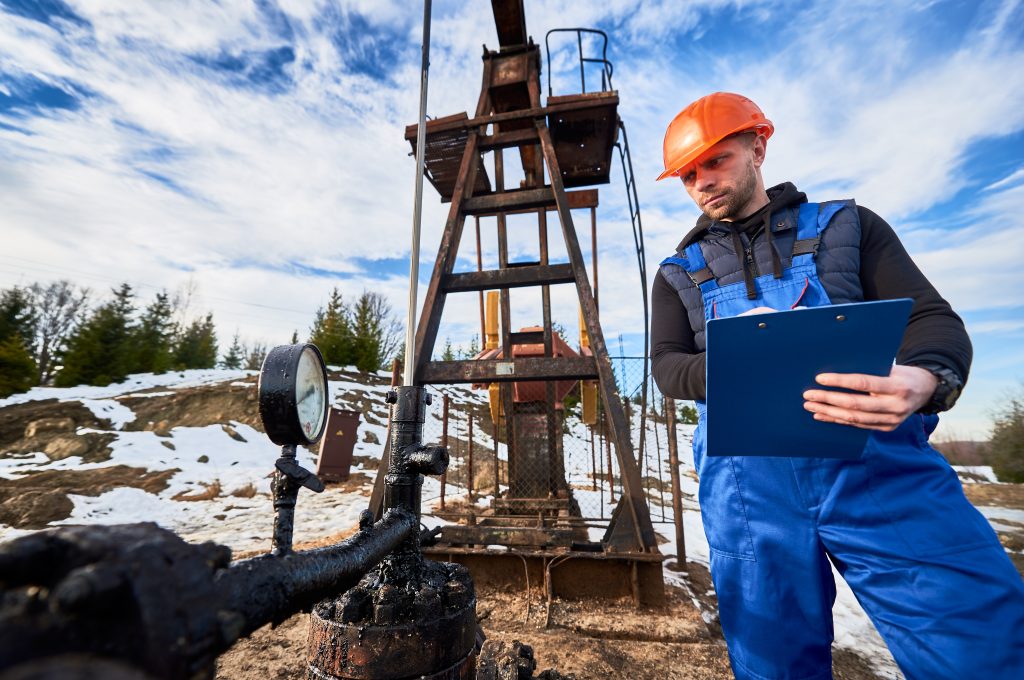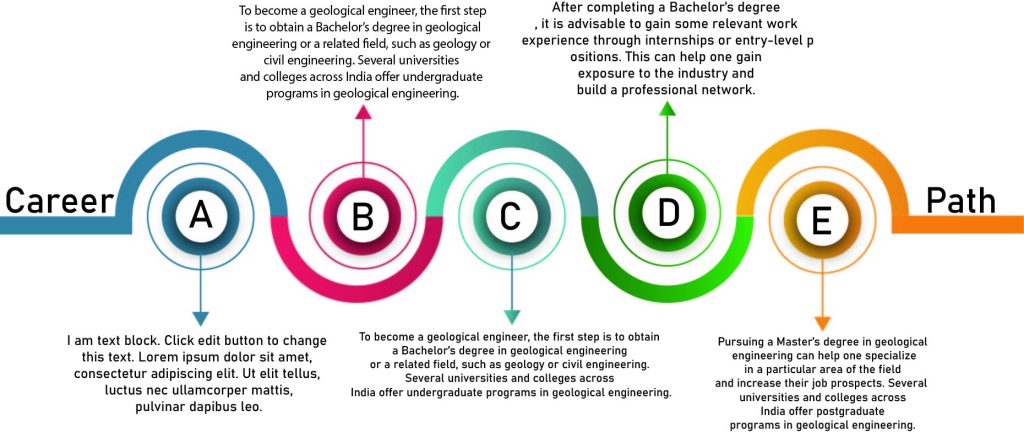Geological engineering is a branch of engineering that focuses on the interaction between the Earth’s natural materials and the built environment. It involves the application of geology, geotechnical engineering, and other related fields to design, build, and maintain structures, infrastructure, and systems that can withstand natural hazards and geological forces. This field is important for a range of industries, including construction, mining, oil and gas, and environmental management. Geological engineers work to ensure that projects are safe, sustainable, and effective, taking into account the unique geological characteristics of each location.

Work description
Geological engineers are responsible for applying their knowledge of geology and engineering principles to design, develop, and manage projects related to the Earth’s natural materials.
Geological engineers must assess the geologic conditions of a site before any construction or engineering project can begin. They perform fieldwork to gather data about soil and rock formations, water flow, and other geological factors.
Geological engineers develop plans and specifications for the construction of various structures, such as dams, tunnels, and buildings.
Geological engineers oversee the construction process to ensure that the plans are implemented correctly. They may work with construction crews, architects, and other professionals to ensure that the project stays on schedule and within budget.
Geological engineers may conduct research on geological processes to better understand how natural hazards and environmental factors can impact engineering projects.
Geological engineers may provide recommendations to government agencies, developers, and other stakeholders regarding the safety and feasibility of proposed construction projects.
They may also provide guidance on the management of natural resources, such as water and minerals.
High Demand
There is a high demand for geological engineers, particularly in industries such as mining, oil and gas, and construction.
Lucrative salaries
Geological engineering offers a variety of work, from fieldwork and data collection to design and management of engineering projects.
Opportunities for innovation
Geological engineers may have opportunities to travel to different sites and locations for fieldwork or project management.
Versatility
Geological engineering is a well-paying field, with competitive salaries for experienced professionals.
Flexibility
Geological engineering allows professionals to make a positive impact on society by designing and managing projects that protect people and the environment from natural hazards.
Job satisfaction
Geological engineers can advance their careers by gaining experience, obtaining certifications, and pursuing further education in related fields.
High stress
Geological engineering can be physically demanding, particularly fieldwork that involves working outdoors in rugged terrain and inclement weather.
Long hours
Geological engineers may be exposed to potential hazards such as landslides, earthquakes, and other natural disasters while working in the field.
Competitive field
Managing engineering projects can be high stress, particularly when dealing with tight deadlines and budgets.
Constant learning
Becoming a geological engineer requires obtaining a relevant bachelor’s degree and potentially a professional engineering license, which can require a significant amount of time and effort.
Isolation
Geological engineering jobs may be located in specific regions or countries, limiting geographic flexibility for those seeking job opportunities.
Eye strain and other physical health issues
Some industries that employ geological engineers, such as mining and oil and gas, may experience fluctuations in demand and employment opportunities.
The cost of pursuing a career in geological engineering in India can vary depending on several factors, such as the type of institution, location, and duration of study.
Pursuing a Bachelor’s degree in geological engineering from a reputed institution in India can cost around INR 2-5 lakhs per year for tuition fees, plus additional expenses such as housing, textbooks, and equipment.
Pursuing a Master’s degree in geological engineering in India can cost around INR 1-3 lakhs per year for tuition fees, plus additional expenses.
Becoming a licensed professional engineer in India requires passing the Graduate Aptitude Test in Engineering (GATE) exam, which requires an application fee.
Apart from these, other expenses like living expenses can also add up to the investment for pursuing a career in geological engineering.
[wpcharts type=”horizontalbarchart” bgcolor=”red:gray:yellow,blue:gray:yellow,random:gray:yellow,purple:gray:yellow” min=”0″ legend=”true” titles=”2 year , 5 year” values=”3,7,5,12″]
The earning potential of a geological engineer in India can vary depending on several factors, such as their level of education, years of experience, and industry. However, on average, a geological engineer in India can expect to earn a salary ranging from INR 4-15 lakhs per year.
Entry-level geological engineering positions in India typically offer salaries ranging from INR 4-7 lakhs per year. With experience, geological engineers can earn higher salaries, ranging from INR 8-15 lakhs per year. Geological engineers working in the mining, oil and gas, and construction industries generally earn higher salaries than those working in other industries.
It is important to note that these are approximate salary ranges and can vary depending on the specific employer, location, and other factors.
[wpcharts type=”horizontalbarchart” bgcolor=”red:gray:yellow,blue:gray:yellow,random:gray:yellow,purple:gray:yellow” min=”0″ legend=”false” titles=”Entry-Level, Mid-Career, Senior-Level ” values=”5,15,25,35,45,55″]
Strong background in science and mathematics.
Strong analytical and problem-solving skills.
Attention to detail.
Physical stamina for fieldwork.
Good communication skills.
Ability to work in a team.
Interest in geology and the earth sciences.
Weakness in science and mathematics.
Lack of attention to detail.
Poor communication skills.
Inability to work in a team.a
Lack of physical stamina for fieldwork.
Limited interest in geology and the earth sciences.
Inability to manage stress and work under tight deadlines.
Work-life balance
The work-life balance of a geological engineer can vary depending on their job responsibilities, work location, and employer. Many geological engineers have the flexibility to choose their work schedules, which can allow for a better work-life balance. Fieldwork can be physically demanding, but it also provides an opportunity to travel and experience different locations, which can be a perk for those who enjoy outdoor activities. Geological engineering can involve long hours, especially when working on projects with tight deadlines. Fieldwork can take place in remote locations, which can make work-life balance challenging, especially for those with families. Fieldwork schedules can be unpredictable due to weather conditions, project changes, or other factors. Geological engineers may face stress and pressure to meet project deadlines and ensure the accuracy of their work.

Geological engineers play a vital role in the development of natural resources, such as oil and gas, minerals, and groundwater, which are essential for economic growth and human well-being.
Geological engineers work to minimize the environmental impact of resource extraction and other engineering projects.
They help ensure public safety by assessing and mitigating geological hazards such as landslides, earthquakes, and volcanic eruptions.
Geological engineers contribute to scientific research by investigating the earth’s processes and history, which can help us better understand the planet and its resources.
Some geological engineering projects, such as mining or oil and gas extraction, can have significant environmental impacts, including habitat destruction, pollution, and greenhouse gas emissions.
The rapid pace of development in geological engineering can lead to the overexploitation of natural resources and contribute to climate change.
Mining Engineering
focuses on the extraction of minerals and metals from the earth’s crust, including exploration, design, operation, and closure of mines.
Petroleum Engineering
focuses on the exploration, drilling, production, and management of oil and gas resources.
Geotechnical Engineering
focuses on the study of soil and rock properties, the behavior of earth materials under different conditions, and the design of foundations, tunnels, slopes, and other infrastructure.
Environmental Engineering
focuses on managing and mitigating the impact of human activities on the environment, including remediation of contaminated sites, waste management, and water resources management.
Geological Exploration
focuses on discovering and assessing mineral and energy resources, identifying geological hazards, and investigating earth processes and history.
Conclusion:
In conclusion, geological engineering can be a rewarding career path for those who are passionate about the earth sciences, natural resource development, and problem-solving. With diverse job opportunities, high demand for skilled professionals, and a strong emphasis on sustainability, geological engineering offers a challenging and fulfilling career with the potential for personal and professional growth.



